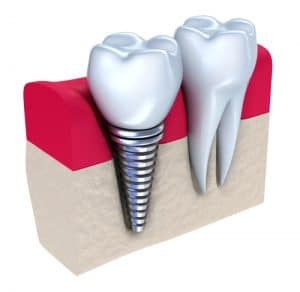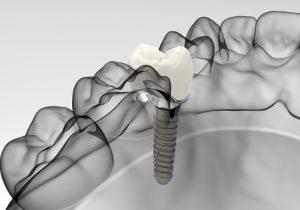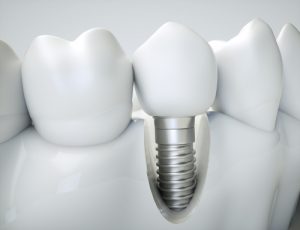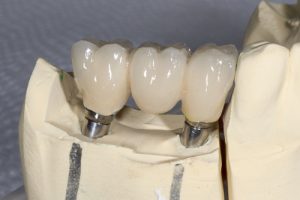 Have you lost multiple teeth? Losing a majority of your teeth can mean poor oral hygiene, as well as other serious complications. Fortunately, we can offer a long lasting and lifelike solution for advanced tooth loss. How do implant dentures work? Can anyone receive them?
Have you lost multiple teeth? Losing a majority of your teeth can mean poor oral hygiene, as well as other serious complications. Fortunately, we can offer a long lasting and lifelike solution for advanced tooth loss. How do implant dentures work? Can anyone receive them?
What Are The Benefits Of Dental Implants?
 In recent years, more and more people have shown interest in replacing teeth with dental implants. While dental bridges and removable dentures are still available, dental implants offer a number of benefits over more traditional means of tooth replacement. What are these benefits? How do they differ from other forms of tooth replacement?
In recent years, more and more people have shown interest in replacing teeth with dental implants. While dental bridges and removable dentures are still available, dental implants offer a number of benefits over more traditional means of tooth replacement. What are these benefits? How do they differ from other forms of tooth replacement?
Do You Have Questions About Implant Candidacy?
 Patients with one or more missing teeth can experience a reduction in quality of life. From trouble eating a variety of foods to trouble speaking clearly, tooth loss presents a number of difficulties. Fortunately, we can offer dental implants to provide strong and lifelike tooth replacement. Do you have questions about implant candidacy?
Patients with one or more missing teeth can experience a reduction in quality of life. From trouble eating a variety of foods to trouble speaking clearly, tooth loss presents a number of difficulties. Fortunately, we can offer dental implants to provide strong and lifelike tooth replacement. Do you have questions about implant candidacy?
Do You Really Offer Teeth In A Day?
 Dental implants can help address tooth loss and restore your ability to eat and speak just as you did prior to losing your tooth/teeth. However, the process can involve a lengthy healing period as the implants bond with the jawbone. But what if you could receive teeth in a day? We offer a unique procedure that can deliver just that, a whole smile in a single day.
Dental implants can help address tooth loss and restore your ability to eat and speak just as you did prior to losing your tooth/teeth. However, the process can involve a lengthy healing period as the implants bond with the jawbone. But what if you could receive teeth in a day? We offer a unique procedure that can deliver just that, a whole smile in a single day.
How Do I Protect My Teeth?
 When a patient loses one or more teeth, we’re prepared to help them restore their smile with dental implants. However, we also believe that with a preventive approach to oral healthcare, you can help avoid tooth loss and protect your teeth. In addition, these steps can help patients who have already lost a tooth avoid further lost teeth down the road.
When a patient loses one or more teeth, we’re prepared to help them restore their smile with dental implants. However, we also believe that with a preventive approach to oral healthcare, you can help avoid tooth loss and protect your teeth. In addition, these steps can help patients who have already lost a tooth avoid further lost teeth down the road.
FAQs: Do Dental Implants Look Natural?
 People suffering from tooth loss often come to us with questions about dental implants. Aside from cost and placement, the most common questions tend to be about appearance. Will the dental implants look natural? Will they blend with the rest of the smile? We’re happy to address any questions our patients have about the appearance and design of their replacement teeth.
People suffering from tooth loss often come to us with questions about dental implants. Aside from cost and placement, the most common questions tend to be about appearance. Will the dental implants look natural? Will they blend with the rest of the smile? We’re happy to address any questions our patients have about the appearance and design of their replacement teeth.
The Dangers Of Tooth Loss
 With dental implants, we can provide strong, natural looking tooth replacement that has the potential to last a lifetime. When you lose one or more teeth, both your appearance and oral health can suffer. Dangers related to tooth loss can include an older appearance and poor alignment. We always urge our patients to see us as soon as possible to discuss tooth replacement options. Otherwise, your overall health can suffer.
With dental implants, we can provide strong, natural looking tooth replacement that has the potential to last a lifetime. When you lose one or more teeth, both your appearance and oral health can suffer. Dangers related to tooth loss can include an older appearance and poor alignment. We always urge our patients to see us as soon as possible to discuss tooth replacement options. Otherwise, your overall health can suffer.
Quiz: Dental Implant Benefits
 What do you know about dental implants and their benefits? Many people are still unfamiliar with this unique and lifelike option for replacing missing teeth. From stimulating jawbone growth to improving nutritional intake, they offer a host of benefits over more traditional methods of replacing lost teeth.
What do you know about dental implants and their benefits? Many people are still unfamiliar with this unique and lifelike option for replacing missing teeth. From stimulating jawbone growth to improving nutritional intake, they offer a host of benefits over more traditional methods of replacing lost teeth.
Do You Need Implant Dentures?
 We often discuss how dental implants can replace a single lost tooth. But what about advanced tooth loss? We can use multiple implant posts to support a set of dentures, restoring function for people who have lost most or all of their teeth. Do you need implant dentures? How do they differ from traditional, removable prosthetics?
We often discuss how dental implants can replace a single lost tooth. But what about advanced tooth loss? We can use multiple implant posts to support a set of dentures, restoring function for people who have lost most or all of their teeth. Do you need implant dentures? How do they differ from traditional, removable prosthetics?
Do You Need A Bridge Or Partial?
 In addition to replacing a single tooth, we can use dental implants to secure a prosthetic, addressing more substantial tooth loss in the process. The form of prosthetic we recommend will depend on the severity of your tooth loss. Do you need a bridge or partial to restore your smile to full function and health? What’s the difference between these two options?
In addition to replacing a single tooth, we can use dental implants to secure a prosthetic, addressing more substantial tooth loss in the process. The form of prosthetic we recommend will depend on the severity of your tooth loss. Do you need a bridge or partial to restore your smile to full function and health? What’s the difference between these two options?




Recent Comments